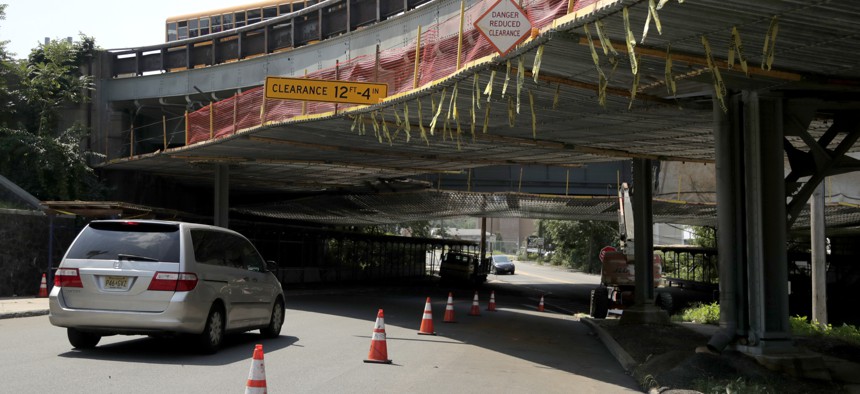Key Senators Pledge to Move on Federal Highway Bill This Summer

A vehicle rides on Liberty Avenue ahead of a project to remodel the Route 495 bridge which feeds into the Lincoln Tunnel, Wednesday, Aug. 15, 2018, in North Bergen, N.J. Julio Cortez/AP Photo

Connecting state and local government leaders
But lawmakers acknowledge that figuring out a long-term plan to pay for transportation infrastructure remains a major challenge.
A key senator on transportation policy doubled down on his commitment Wednesday to “be first out of the gate” to pass a surface transportation infrastructure bill out of committee by the end of the summer.
But with revenue from the federal gas tax on the decline as a result of Americans’ increased use of more fuel-efficient cars, lawmakers continue to debate the broader question of how to pay for the infrastructure reauthorization.
Chairman John Barrasso, a Wyoming Republican, said during a Wednesday hearing of the Senate Environment and Public Works Committee that he and ranking member Sen. Tom Carper are committed to finding a way to “responsibly pay for the legislation.”
Both lawmakers expressed support for efforts to move away from reliance on the gas tax, with Barrasso saying he wants see all road users contribute to infrastructure maintenance and improvements.
“That must include electric vehicles and other alternative fuel vehicles which will become an increasing share of the cars on the roads,” he said.
Carper, a Delaware Democrat, said funding needs to ultimately switch to a vehicle-miles traveled approach.
“That’s maybe about 10 years from now,” he said.
The discussion comes ahead of the 2020 expiration of the Fixing America’s Surface Transportation (FAST) Act, a five-year comprehensive spending bill that authorized $305 billion in federal funding for improvements to highways, bridges, and mass transportation projects.
The Highway Trust Fund is the primary source of funding for many of the programs paid for through the FAST Act. But the gas tax revenue collected is no longer enough to pay for projects funded through the fund, and the Congressional Budget Office projects that outlays for the fund will exceed reserves by $119 billion by 2028.
The federal gas tax is 18.4 cents a gallon for unleaded and 23.4 cents a gallon for diesel. While Congress has left the federal tax untouched since 1993, numerous states have increased their own tax rates in order to pay for transportation projects. At least 33 states increased their gas taxes since 2010, according to NPR.
Increasing the federal gas tax to pay for the Highway Trust Fund is seen as a non-starter by many Republican lawmakers who oppose tax hikes.
Several transportation experts who testified at Wednesday’s committee hearing acknowledged the declining gas tax revenues and suggested other mechanisms to fund transportation infrastructure.
Some states have started to experiment with user-based pilot programs like fees for vehicle miles traveled or tolling, said Vicki Arroyo, executive director of the Georgetown Climate Center. She said states could also consider carbon-based pricing or look to increase the fees paid by large trucks based on their outsize impact on the roadways.
“Being able to support user fees is the way to go,” said Carolann Wicks, former secretary of the Delaware Department of Transportation and a senior policy fellow at the University of Delaware. ”It is not always easy though on existing road systems you already have to do that. Transitioning to mileage-based user fee is something we should not take our eye off the ball because that might be a more equitable way to generate those funds.”
In Utah, legislation requiring owners of hybrid and electric cars to pay user fees took effect in January. The state also plans to implement a voluntary road charge usage fee that electric car owners could opt to pay instead of the flat user fee, said Carlos Braceras, president of the American Association of State Highway and Transportation Officials and executive director of the Utah Department of Transportation.
Regardless of how they pay for it, panelists at Wednesday’s hearing urged lawmakers to pass a multi-year reauthorization in order to provide stability to state department of transportation (DOT) planners who face a continuous backlog of projects.
“The lack of stable, predictable funding from the Highway Trust Fund makes it nearly impossible for state DOTs to plan for large projects that need a reliable flow of funding over multiple years,” Braceras said.
Nationwide, the investment backlog for transportation funding totals $836 billion in highway and bridge projects and $122 billion in transit projects, he said.
Failure to pass reauthorization of a transportation infrastructure bill would be “extremely disruptive” to state and local planners, Wicks said.
“Engineering projects take time whether you are planning, design, funding for construction,” Wicks said. “All of that becomes very unpredictable if you can’t know for sure how much money and resources will be available going forward.”
Andrea Noble is a staff correspondent with Route Fifty.

NEXT STORY: Rockefeller Foundation Commits $8 Million to New Climate and Resilience Program




